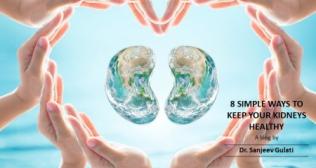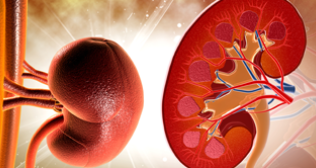
Simplifying Fact about Kidney Disease & Dialysis
Kidney disease is a condition of damaged kidneys when waste & fluid are not getting removed, instead getting accumulated in the body. In India, over 1, 75,000 patients are on chronic dialysis and every year about 2,20,000-2,75,000 new patients need kidney or Renal Replacement Therapy. High blood pressure and Diabetes are most common cause of kidney diseases followed by Inflammation, infection, kidney obstruction e.g. renal stones, enlarged prostate, genetic condition e.g . Polycystic kidney disease, long time use of pain killers etc. Here are some common queries which will simplify your understanding about kidney disease and dialysis:
Answers to Common Queries:
Myths Resolved
1. Doctor has asked me to initiate dialysis. Is it the end of my life? The answer is a BIG NO. You can take dialysis and still enjoy life. Although kidney transplantation is best option, patients on dialysis can enjoy their life even better after transplant.
2. Doctor has advised 3 dialysis per week. Is it ok to have only 1 or 2 sessions instead? Adequate dialysis is important to develop a good appetite and quality of food intake. Inadequate dialysis can lead to loss of appetite, weight loss, anemia and breathing difficulties.
3. What happens during hemodialysis? During hemodialysis, blood leaves your body through the access, travels through and is filtered by the dialysis apparatus, later on returns to your body.
4. Why are regular biochemical tests advised? They are done to make necessary changes in medications and dialysis prescription.
5. How much fluid should I take? Usually daily fluid intake is around 600 ml in addition to your urine output.
6. Can I eat all kinds of fruits and vegetables? No. You must restrict your food items that are rich in potassium, sodium and phosphorus.
7. How to take low salt diet? You can keep 3 grams (half tablespoon) separately; add it little by little during eating.
8. Why am I getting muscle cramps during dialysis? When fluid removal is high, patients usually get muscle cramps. Inform your doctor. Avoid weight gains between two dialysis sessions.
9. Is it normal to feel extremely thirsty? A good sign and it means that you are staying within your fluid limits.
10. What if I feel depressed? Emotional health is also important. Talk to a dialysis social worker or doctor, take help from life partner, family members, friends, and other patients.
11. Can I continue my job? Yes, you can. However, if your job requires a lot of physical labor (heavy lifting, digging, driving etc.), you may need to find alternate options.
12. Can I travel? Post approval from your treating doctor and after arrangement of dialysis at nearest place of your destination.
Categories
Clear allMeet the doctor

- Nephrology | Nephrology
-
30 Years
-
1800



















